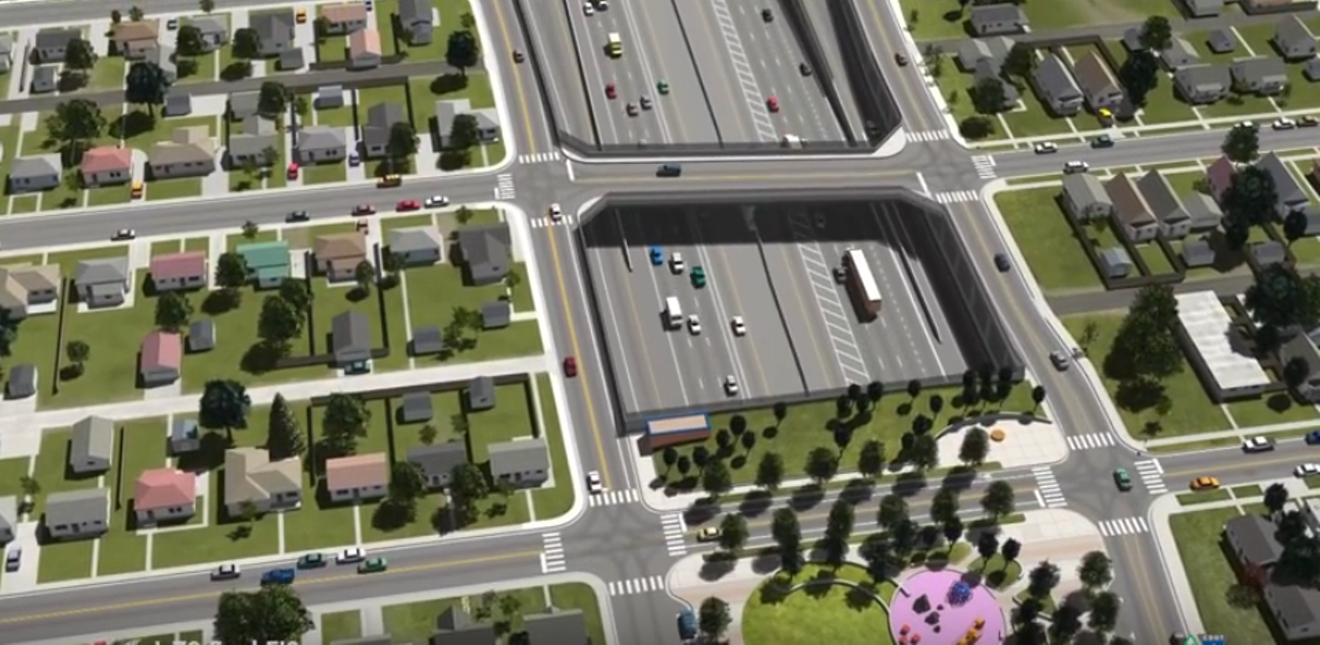A telephone survey seeking opinions about the expansion of I-70 through east Denver is generating irate protests from some respondents, who say the survey seems designed to elicit positive responses about the purported benefits of the $1.8 billion project.
"It was one of the most one-sided push polls I ever listened to," Larry Patchett, a production technician for public television, wrote in a complaint to CDOT. "The entire thing was just a series of opportunities to validate your suppositions and PR spin on the I-70 Ditch project."
The project, which would replace a crumbling six-lane viaduct with a below-grade, partially covered superhighway expanded to ten lanes, has been a source of controversy and anger in neighborhoods flanking I-70 for years. (The dispute has triggered a lawsuit by the Sierra Club, claiming the EPA lowered its emission standards to allow the expansion, as well as legal attacks on a massive stormwater project by the City of Denver that will help keep the below-grade design from flooding.) But you'd never know it from the questions asked of 400 or so local residents in the recent survey, designed and conducted for CDOT by a private firm.
The stated goals of the survey included gauging public perceptions about the I-70 expansion, what sort of impact motorists expect the project to have on their current and future driving patterns, and figuring out the best way to communicate about the project to residents and commuters. Several of the questions seek demographic information about highway users and ask about how the construction would affect their personal travel plans; others ask about whether respondents had positive or negative reactions to the below-grade design and the construction of a "four-acre park-like cover" that's supposed to help reconnect the economically disadvantaged neighborhoods split by the interstate half a century ago.
But the section that seems to have left some respondents seething stresses the "possible long-term benefits that this project might have" after construction is completed. It asks how important reduced travel time, "increased jobs in surrounding neighborhoods," "increased local neighborhood connectivity" and other assorted benefits will be to Denver residents.
That struck some participants as highly loaded language. Opponents of the expansion have claimed the construction will mean more disruption, pollution and demolition of precious housing stock in some of Denver's most affordable communities — and, in the long run, redevelopment schemes that will drive longtime residents out of the area.
"The call took 34 minutes, and at the end of it, I was livid with fury, my cheeks red and my blood pressure undoubtedly high," one surveyee told Westword. "The real problem with administering a survey like that one is the manipulation that comes from how questions are worded. Two examples that infuriated me: referring to the planned changes as 'improvements' and the end results of the project as 'benefits.'"
A poster on the Ditch the Ditch Facebook page had a similar reaction: “Hello, last night I got a call from Alternative Data doing a survey for CDOT about I-70. Each question they asked was full of bias, and I very firmly indicated my objection. Sadly, the questioner would respond that he only had particular options for responses and didn't have the ability to preserve comments. The questions all focused around 'the I-70 improvements.'"
Patchett says the questions he was asked seemed to focus on the benefits to motorists, not concerns about the impact the expansion will have on local neighborhoods. When he brought up the feared effects on Globeville, Elyria and Swansea, the caller didn't seem to know what he was talking about. "To give the answers I want to give sounds like I'm against children and safety," he says.
CDOT spokeswoman Rebecca White says she's received no formal complaints about the survey, other than from Patchett. The survey is the second in a series the agency plans to conduct annually "to get a sense of what the average driver of I-70 knows about the project." White doesn't regard the survey as biased, but she adds that she's taking Patchett's comments seriously in designing future surveys.
"We do see this as a benefit, or we wouldn't be investing more than a billion dollars in this corridor," she notes. "Still, perhaps there is a more neutral word we can use going forward."
Ironically, CDOT recently issued a statewide alert warning of a phone scam, in which callers claim to be conducting a survey for the agency as a pretext for eliciting personal information. Patchett thinks the I-70 survey should come with some warnings of its own. As he noted in his complaint to the agency, "I'm not sure what was most offensive, the section of the poll offering my choice of ways to be given your spin on a regular basis or the part where I was given the chance to praise your expectations as to what the project might accomplish."
[
{
"name": "Air - MediumRectangle - Inline Content - Mobile Display Size",
"component": "12017618",
"insertPoint": "2",
"requiredCountToDisplay": "2"
},{
"name": "Editor Picks",
"component": "17242653",
"insertPoint": "4",
"requiredCountToDisplay": "1"
},{
"name": "Inline Links",
"component": "18838239",
"insertPoint": "8th",
"startingPoint": 8,
"requiredCountToDisplay": "7",
"maxInsertions": 25
},{
"name": "Air - MediumRectangle - Combo - Inline Content",
"component": "17261320",
"insertPoint": "8th",
"startingPoint": 8,
"requiredCountToDisplay": "7",
"maxInsertions": 25
},{
"name": "Inline Links",
"component": "18838239",
"insertPoint": "8th",
"startingPoint": 12,
"requiredCountToDisplay": "11",
"maxInsertions": 25
},{
"name": "Air - Leaderboard Tower - Combo - Inline Content",
"component": "17261321",
"insertPoint": "8th",
"startingPoint": 12,
"requiredCountToDisplay": "11",
"maxInsertions": 25
}
]












